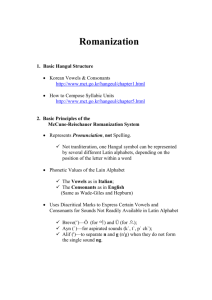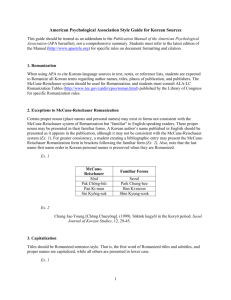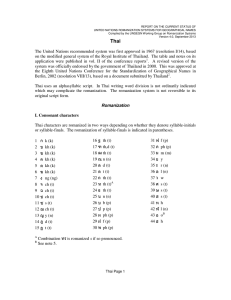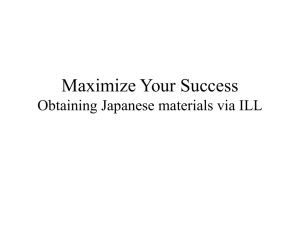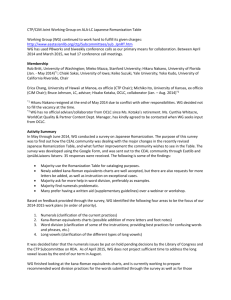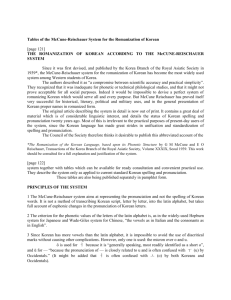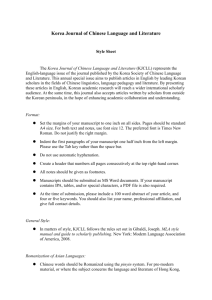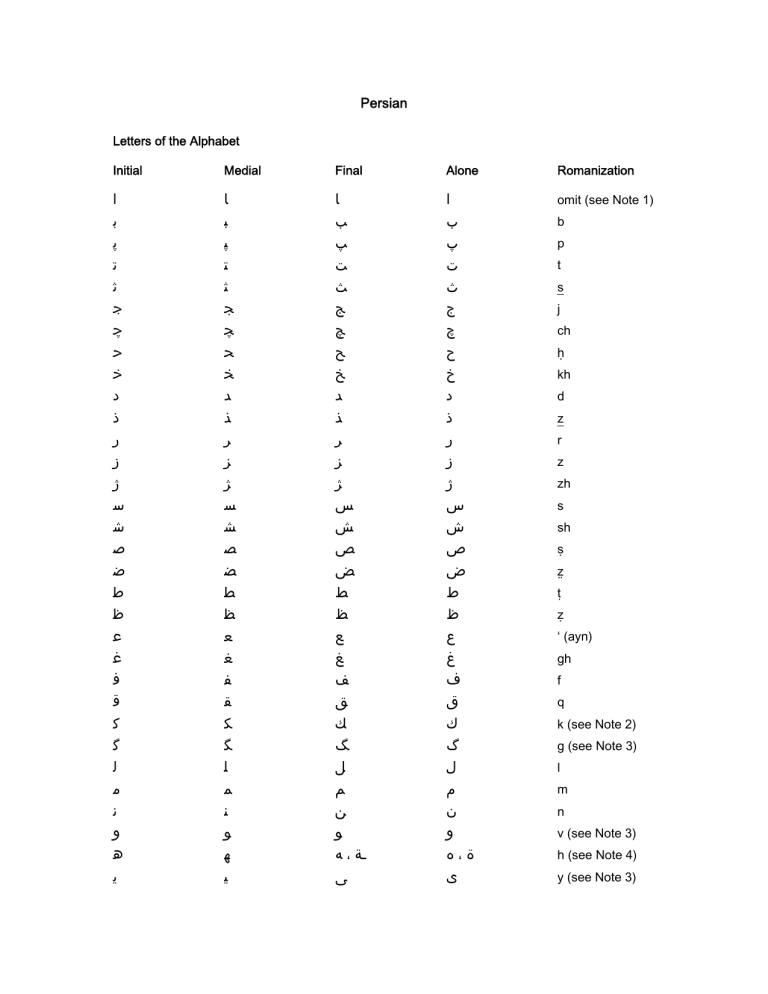
Persian Letters of the Alphabet Initial Medial Final Alone Romanization ا ﺑ ﭘ ﺗ ﺛ ﺟ ﭼ ﺣ ﺧ ﺩ ﺫ ﺭ ﺯ ﮊ ﺳ ﺷ ﺻ ﺿ ﻃ ﻇ ﻋ ﻏ ﻓ ﻗ ﻛ ﮔ ﻟ ﻣ ﻧ ﻭ ﻫ ﻳ ﺎ ﺒ ﭙ ﺘ ﺜ ﺠ ﭽ ﺤ ﺨ ﺪ ﺬ ﺮ ﺰ ﮋ ﺴ ﺸ ﺼ ﻀ ﻄ ﻈ ﻌ ﻐ ﻔ ﻘ ﻜ ﮕ ﻠ ﻤ ﻨ ﻮ ﻬ ﻴ ﺎ ﺐ ﭗ ﺖ ﺚ ﺞ ﭻ ﺢ ﺦ ﺪ ﺬ ﺮ ﺰ ﮋ ﺲ ﺶ ﺺ ﺾ ﻂ ﻆ ﻊ ﻎ ﻒ ﻖ ﻚ ﮓ ﻞ ﻢ ﻦ ﻮ ﻪ، ـﺔ ﻰ ا ﺏ ﭖ ﺕ ﺙ ﺝ ﭺ ﺡ ﺥ ﺩ ﺫ ﺭ ﺯ ﮊ ﺱ ﺵ ﺹ ﺽ ﻁ ﻅ ﻉ ﻍ ﻑ ﻕ ﻙ ﮒ ﻝ ﻡ ﻥ ﻭ ه،ة ﻯ omit (see Note 1) b p t s j ch ḥ kh d z r z zh s sh ṣ z̤ ṭ ẓ ‘ (ayn) gh f q k (see Note 2) g (see Note 3) l m n v (see Note 3) h (see Note 4) y (see Note 3) Vowels and Diphthongs (see Note 5) َ◌ ُ ◌ ِ ◌ آ، ◌َا ◌َ ﻯ ◌ُ ﻭ a u i ā (see Note 6) á (see Note 7) ū ◌ِ ﻯ ْ◌َ ﻭ ْ◌َ ﻯ ī aw ay Notes 1. For the use of ( اalif) to support ( ءhamzah) and romanization of ءand (maddah), see rule 1(a). For the , see rules 4 and 5 respectively. For the use of ( اalif) to represent the long vowel romanized ā, see the table of vowels and diphthongs, and rule 1(b). 2. Final and (often written کand )گmay have the form ﻚ, without the distinguishing upper stroke or strokes. The two letters are always distinguished in romanization. 3. For other values of وand ی, see the table of vowels and diphthongs, and rules 2, 3, and 7. 4. ( ةdotted )هwhen used as an alternative to تis romanized t. 5. Vowel points are not printed on Library of Congress cards. 6. See rules 1(b) and 5. 7. See rule 3(d). RULES OF APPLICATION Letters Which May Be Romanized in Different Ways Depending on Their Context 1. ( اalif) is used: (a) As a support for ( ءhamzah) and (maddah). In these cases it is not represented in romanization. See rules 4 and 5. (b) To indicate the long vowel romanized ā. For the use of اin tanvīn, see rule 6. dānā 2. داﻧﺎ ﻭis used to represent: (a) The consonant romanized v. varzish davā sarv ورزش دوا ﺳﺮو Silent وfollowing ﺨis retained in romanization. khvāstan khvud ﺧﻮاﺳﺘﻦ ﺧﻮد (b) The long ū-vowel (and short u-vowel in some monosyllables) is romanized ū. dūr chūn tū (c) دور ﭼﻮن ﺗﻮ The diphthong romanized aw. ﻓﺮدوﺳﯽ When the diphthong precedes a consonantal و, the combination is romanized Firdawsī avv. See rule 7. وmay be used as a support for ( ءhamzah); in this case it is not represented in romanization. See rule 4. 3. یis used to represent: (a) The consonant romanized y. yār siyāh pāy (b) The long vowel romanized ī. Īrān qālī (c) اﯾﺮان ﻗﺎﻟﯽ The diphthong romanized ay. ayvān ray (d) ﯾﺎر ﺳﯿﺎه ﭘﺎی اﯾﻮان ری The final long vowel romanized á. Muṣṭafá َﻣﺼﻄﻔﯽ For the use of ( یy) as a mark of iz̤āfah, see rule 8(c). یin the medial forms ﯨ, ﯩ, without dots, may be used as a support for ( ءhamzah); in this case یis not represented in romanization. See rule 4 below. Orthographic Symbols Other than Letters and Vowel Signs The signs listed below are frequently omitted in Persian writing and printing; their presence must then be inferred. They are represented in romanization according to the following rules: 4. ( ءhamzah) (a) When initial, ءis not represented in romanization. (b) When medial or final, ءis romanized ʼ (alif) except as noted in (c) and (d) below. muʼassir khulafāʼ ﻣﺆﺛﺮ ﺧﻠﻔﺎء pāʼīn ﭘﺎﺋﯿﻦ (c) When used as a mark of iz̤āfah, ءis romanized -ʼi. (d) آﺳﺘﺎﻧﮥ در When used to mark the indefinite article, ءis romanized ʼi. khānahʼi ﺧﺎﻧﮥ āstānah-ʼi dar 5. (maddah) (a) Initial آis romanized ā. āb Kullīyat al-Ādāb (b) Medial آ, when it represents the phonetic combination ʼā, is so romanized. maʼāsir Daryāʼābādī (c) ﻣﺂﺛﺮ درﯾﺎآﺑﺎدی is otherwise not represented in romanization. girdāvarandah 6. آب ﮐﻠﯿﺔ اﻵداب ﮔﺮدآورﻧﺪه Tanvīn, (written ٌ◌, ٍ◌, ً◌, )◌ًا, which occurs chiefly in Arabic words, is romanized un, in, an, and an, respectively. 7. ّ◌ (shaddah or tashdīd) is represented by doubling the letter or digraph concerned. khurram ﺧﺮّم avval اوّل bachchah ﺑﭽّﻪ Khayyām ﺧﯿّﺎم Note the exceptional case where ّ◌ is written over وand یto represent the combination of long vowel plus consonant. nashrīyāt qūvah ﻧﺸﺮﯾّﺎت ﻗﻮّه Grammatical Structure as It Affects Romanization 8. Iz̤āfah. When two words are associated in the relation known as iz̤āfah, the first (the muz̤āf) is followed by an additional letter or syllable in romanization. This is added according to the following rules: (a) When the muz̤āf bears no special mark of iz̤āfah, it is followed by -i. dar-i bāgh qālī-i Īrān khānah-i buzurg در ﺑﺎغ ﻗﺎﻟﯽ اﯾﺮان ﺧﺎﻧﻪ ﺑﺰرگ (b) When the muz̤āf is marked by the addition of ء, it is followed by -ʼi. ﻗﺎﻟﺊ اﯾﺮان khānah-ʼi buzurg ﺧﺎﻧﮥ ﺑﺰرگ When the muz̤āf is marked by the addition of ی, it is followed by -yi. rū-yi zamīn روی زﻣﯿﻦ Daryā-yi Khazar درﯾﺎی ﺧﺰر khānah-yi buzurg ﺧﺎﻧﻪی ﺑﺰرگ qālī-ʼi Īrān (c) (d) Iz̤āfah is represented in romanization of personal names only when expressly identified in the Persian script. Affixes and Compounds 9. Affixes. (a) When the affix and the word with which it is connected grammatically are written separately in Persian, the two are separated in romanization by a single prime ( ʹ ). See also 12(b) below. khānahʹhā khānahʹam khānahʹī mīʹravam but mīravam bihʹgū barʹrasīhā Kāẓimʹzādah but (b) Kāẓimzādah ﺧﺎﻧﻪﻫﺎ ﺧﺎﻧﻪام ﺧﺎﻧﻪای ﻣﯽروم ﻣﯿﺮوم ﺑﻪﮔﻮ ﺑﺮرﺳﯿﻬﺎ ﮐﺎﻇﻢزاده ﮐﺎﻇﻤﺰاده The Arabic article al is separated by a hyphen, in romanization, from the word to which it is prefixed. dār al-muʻallimīn ʻAbd al-Ḥusayn 10. دار اﻟﻤﻌﻠﻤﯿﻦ ﻋﺒﺪ اﻟﺤﺴﯿﻦ Compounds. When the elements of a compound (except a compound personal name) are written separately in Persian, they are separated in romanization by a single prime ( ʹ ). See also 12(b) below. marīz̤ʹkhānah but marīz̤khānah Shāhʹnāmah but Shāhnāmah ﻣﺮﯾﺾﺧﺎﻧﻪ ﻣﺮﯾﻀﺨﺎﻧﻪ ﺷﺎهﻧﺎﻣﻪ ﺷﺎﻫﻨﺎﻣﻪ Note the treatment of compound personal names: Ghulām ʻAlī Shāh Jahān Ibn Abī Ṭālib ﻏﻼﻣﻌﻠﯽor ﻏﻼم ﻋﻠﯽ ﺷﺎﻫﺠﻬﺎنor ﺷﺎه ﺟﻬﺎن اﺑﻦ اﺑﯿﻄﺎﻟﺐor اﺑﻦ اﺑﻲ ﻃﺎﻟﺐ Orthography of Persian in Romanization 11. Capitalization. (a) Rules for the capitalization of English are followed, except that the Arabic article al is lowercased in all positions. (b) 12. Diacritics are used with both capital and lowercase letters. The single prime ( ʹ ) is used: (a) To separate two letters representing two distinct consonantal sounds, when the combination might otherwise be read as a digraph. marzʹhā (b) ﻣﺮزﻫﺎ To mark the use of a letter in its final form when it occurs in the middle of a word. See also rules 9(a) and 10 above. rāhʹhā Qāyimʹmaqāmī Bihʹāzīn 13. راهﻫﺎ ﻗﺎﯾﻢﻣﻘﺎﻣﯽ ﺑﻪآذﯾﻦ Foreign words in a Persian context, including Arabic words, are romanized according to the rules for Persian. For short vowels not indicated in the script, the Persian vowels nearest the original pronunciation of the word are supplied in romanization. 14. Dictionaries. In romanizing Persian, the Library of Congress has found it necessary to consult dictionaries as an appendage to the romanization tables, primarily for the purpose of supplying vowels. For Persian, the principal dictionary consulted is: M. Muʼīn. Farhang-i Fārsī-i mutavassit.
